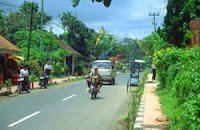Ubud Village Bali

 Ubud lies 36 km from the resorts on the southern coast. The name for this royal village is derived from the Balinese word "ubad" (medicine), the moniker of a herb with healing properties which grows along the nearby Oos River.If you aren't interested in overpriced tourist hype but want comfortable accommodations at good prices, a central location, and all the facilities in a less hurried rural environment than the south, the Ubud area is for you. Despite the bumper-to-bumper traffic, too many loud motorcycles, and thousands of tourists during Bali's peak tourist seasons, when it's difficult to find a parking space, Ubud still shows glimpses of its basically rural character.
Ubud lies 36 km from the resorts on the southern coast. The name for this royal village is derived from the Balinese word "ubad" (medicine), the moniker of a herb with healing properties which grows along the nearby Oos River.If you aren't interested in overpriced tourist hype but want comfortable accommodations at good prices, a central location, and all the facilities in a less hurried rural environment than the south, the Ubud area is for you. Despite the bumper-to-bumper traffic, too many loud motorcycles, and thousands of tourists during Bali's peak tourist seasons, when it's difficult to find a parking space, Ubud still shows glimpses of its basically rural character.The stars over Ubud almost crowd out the sky they're so bright, and during the day the heavens are crowned with fluffy cumulus and wispy cirrus clouds. Wandering around in the crisp night air is pleasant and safe.
Candidasa, Denpasar, and the airport are all only an hour's drive from Ubud, and beautiful landscapes and historical sites-Pujung, Gunung Kawi, Goa Gadjah, Tirta Empul, Yeh Pulu-are within easy reach.
You can enjoy dozens of scenic nature walks around the village-pick any lane and just keep on walking. The best time is at dawn. Just east of Ubud is Bali's former capital, Pejeng, the center of the Balinese Holy Land and home to the highest concentration of antiquities on the island.
Ever since the German painter Walter Spies made his home here in the 1930s, Ubud has been a haven for both native and European artists. In an area of 10 square km in and around this village live Bali's most accomplished dancers, musicians, painters, and carvers. Temple festivals, celebrations, and performing arts-baby's first haircut, dance rehearsals, even an occasional cremation-are offered somewhere in the area every day of the week.
Ubud is a remarkable town in the middle of the island of Bali. For more than a century, it has been the island's preeminent centre for fine arts, dance and music. While it once was a haven for scruffy backpackers, cosmic seekers, artists and bohemians, Ubud is now a hot spot for literati, glitterati, art collectors and connoisseurs. Famous names walk its busy sidewalks everyday. Elegant five star hotels and sprawling mansions now stand on its outskirts, overlooking the most prized views in Bali. Nonetheless, Ubud is still popular with backpackers, mystics and all the finest fringe elements of global society. Ubud is not "ruined". Its character is too strong to be destroyed. It still draws people who add something; people who are actively involved in art, nature, anthropology, music, dance, architecture, environmentalism, "alternative modalities," and more.
Ubud is also the expat capital of Bali. A permanent Western community resides here because cultural and natural attributes make it the ideal place for those who wish to stay for any length of time on Bali. From your 'losmen' or homestay family you can learn how to make a bamboo mouth harp, study painting, maskmaking, and 'gamelan', or learn the art of the 'dalang'.
During your stay in Ubud please do not miss the evening cultural performances which are held almost everyday in various places of Ubud area.
Find your accommodations in Ubud!




Comments
Post a Comment